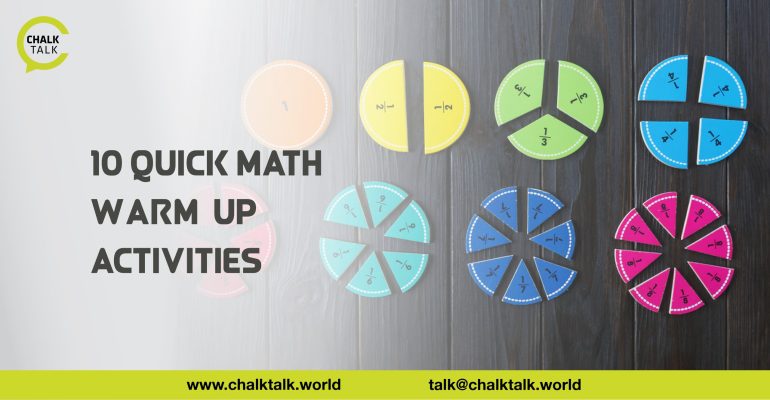Energize Your Math Courses: 10 Quick Math Warm-Up Activities
July 6, 2023 2023-07-06 9:07Energize Your Math Courses: 10 Quick Math Warm-Up Activities

Energize Your Math Courses: 10 Quick Math Warm-Up Activities
Math warm-up activities are an essential component of any successful math course. These activities serve multiple purposes, from reviewing previous concepts to engaging students’ minds and preparing them for the Day’s lesson. Educators can create an environment that fosters enthusiasm, critical thinking, and active participation by incorporating quick and stimulating warm-ups. In this blog, we will explore ten practical math warm-up activities that can add energy and excitement to your math courses, ensuring an optimal learning experience for your students.
Number Sense Riddles
Start your math class with creativity and critical thinking by presenting number-sense riddles. These brain teasers challenge students to solve puzzles and unlock hidden numbers using mathematical reasoning skills. Not only do these riddles activate students’ problem-solving abilities, but they also promote a deeper understanding of number concepts and enhance mental agility.
Math Puzzles and Brain Teasers
Engage your students’ minds with math puzzles and brain teasers that require logical thinking and mathematical manipulation. From Sudoku to crosswords, these activities encourage students to apply their knowledge of various math topics while honing their analytical skills. Incorporating these puzzles as warm-ups can help students develop a love for math and boost their problem-solving abilities.
Quick Mental Math Challenges
Enhance students’ mental math capabilities by incorporating quick math challenges into your warm-up routine. These challenges range from simple addition and subtraction problems to more complex calculations involving multiplication, division, and even fractions. By encouraging students to solve these challenges mentally and without using calculators, you foster their computational fluency and improve their overall math skills.
Math Vocabulary Flashcards
Strengthen students’ math vocabulary and conceptual understanding by introducing math vocabulary flashcards as part of your warm-up activities. Display flashcards with mathematical terms or concepts and ask students to define or explain them. This exercise reinforces students’ understanding of key terms and enhances their communication skills and ability to articulate mathematical ideas clearly.
Estimation Exercises
Develop students’ estimation skills by incorporating estimation exercises into your warm-up routine. Present real-life scenarios or objects and ask students to make educated guesses about quantities, lengths, or values. Estimation activities promote number sense, critical thinking, and the ability to make reasonable approximations—an essential skill in everyday life and mathematical problem-solving.
Math Puzzles and Patterns
Introduce students to the fascinating world of math puzzles and patterns during warm-up sessions. These activities involve recognizing and extending practices, solving number series, or completing visual puzzles. Students develop logical reasoning, pattern recognition, and deductive thinking abilities by engaging in these activities, which are crucial to various math concepts and problem-solving.
The Problem of the Day
Challenge your students with a “Problem of the Day” as a warm-up exercise. Select math problems that align with the current topic or review previously learned concepts. These problems can be open-ended, multiple-choice, or require step-by-step solutions. The “Problem of the Day” encourages students to apply their math knowledge in real-life scenarios and cultivates critical thinking and problem-solving skills.
Math Games
Inject fun and competition into your warm-up routine by incorporating math games. These games create an engaging and interactive learning environment, from card games to board games to online math challenges. They encourage collaboration, strategic thinking, and mathematical reasoning, making them an excellent way to start math classes.
Quick Math Quizzes
Administering quick math quizzes as warm-up activities helps assess students’ understanding of previous lessons while providing an opportunity for revision. Create short quizzes that cover essential math concepts and require students to solve problems or answer multiple-choice questions. These quizzes serve as a formative assessment tool, reinforce key concepts, and build confidence in students’ math abilities.
Math Discussion Starters
Promote mathematical discourse and critical thinking by presenting math discussion starters as warm-up activities. Pose open-ended questions or real-world problems that require students to analyze, reason, and defend their answers. These discussions cultivate a deeper understanding of math concepts, foster collaborative learning, and nurture students’ ability to articulate their thoughts and engage in meaningful mathematical conversations.
As educators, it’s crucial to understand the significance of warm-up activities in the learning process. These activities act as mental stimuli, helping students transition from their previous actions and focus their attention on the upcoming math lesson. Moreover, math warm-ups provide an opportunity to activate prior knowledge and connect to new concepts. Students reinforce their understanding and build a solid foundation for further learning by revisiting previously learned material.
In addition to educational benefits, math warm-up activities positively impact students’ overall attitudes toward math. Students develop a sense of anticipation and curiosity by infusing excitement and engagement at the start of each class. The variety of activities keeps the learning experience fresh and dynamic, fostering a love for math and dispelling any negative perceptions of the subject. As students actively participate in these warm-up activities, they develop confidence in their math abilities and become more motivated to tackle new challenges.
By incorporating these additional paragraphs, we further emphasize the importance of math warm-up activities in enhancing students learning experiences and fostering a positive attitude toward mathematics. These paragraphs highlight how warm-ups contribute to knowledge retention, student engagement, and math proficiency.
Conclusion
Incorporating quick math warm-up activities in your math courses effectively sets a positive tone, engages students’ minds, and reinforces essential mathematical concepts. These activities enhance critical thinking, problem-solving, and communication skills, creating an energetic and interactive learning environment. Implementing the ten activities discussed in this blog can energize your math courses and empower your students to excel in their mathematical journey. Remember, a strong start paves the way for a successful learning experience in the fascinating world of mathematics!


